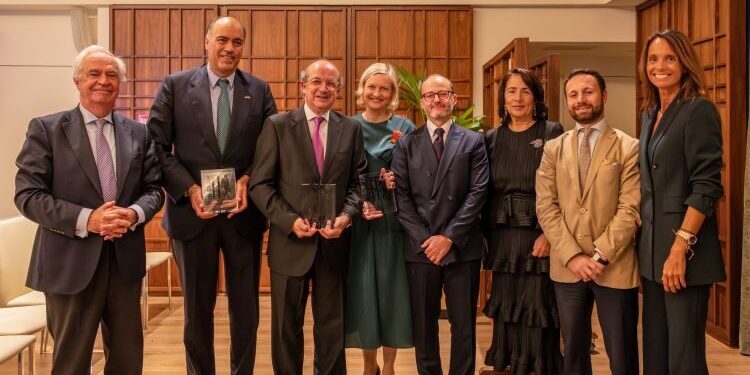The Diplomat
The Polish Institute of Culture, the Embassy of Argentina and diplomat Daniel Calleja Crespo received the awards corresponding to the first edition of The Diplomat in Spain 2025 International Awards on Monday, November 24.
The awards ceremony, which aims to recognize, highlight, and celebrate the work carried out by embassies, international institutions, and foreign organizations in Spain through cultural and economic cooperation projects, took place at the Gran Meliá Fénix Hotel in Madrid, presided over by the Secretary of State for Foreign and Global Affairs, Diego Martínez Belío.
The jury for the first edition of The Diplomat in Spain 2025 International Awards was composed of Charles Powell, director of the Elcano Royal Institute; Irene Lanzaco, president of the Association of Information Media (AMI); Abraham Duarte, rector of Rey Juan Carlos University; Jesús González Mateos, editorial director of The Diplomat in Spain; and Asela Pintado, president of Prensamedia.
Among those attending the event were the ambassadors of Serbia, Vietnam, Argentina, North Macedonia, and Bosnia and Herzegovina, as well as counselors and other representatives from the embassies of Turkey, Venezuela, Greece, Japan, Kenya, Portugal, and Croatia. Representatives from the Elcano Royal Institute, the Alternativas Foundation, Acciona, Quirón, UNHCR, and other organizations were also present.
During the event, Yago González, CEO of the Prensamedia Group, stated that these awards celebrate “the value of understanding, dialogue, and cooperation at a time when everything seems to be moving too fast.” “We are living through a period marked by global tensions, technological transformations, and challenges that no longer recognize borders, and precisely for this reason, the work you do—representing your countries, building bridges, and fostering trust—is more necessary than ever,” he continued, addressing the embassy representatives.
“In this context,” he asserted, “those of us who report on foreign policy also have a responsibility.” “The world has become noisy; words abound, context is scarce, and in this noise, diplomacy risks being oversimplified, or worse, becoming invisible.” Therefore, “The Diplomat was born and has grown with a very clear conviction: diplomacy deserves to be explained rigorously, thoroughly, and respectfully.” “Our goal is not to occupy space, but to shed light. Not to amplify the noise, but to bring order to the conversation,” he added.
For her part, Asela Pintado, president of Prensamedia, stated that “the world only progresses when we understand each other, when we listen, and when we are able to build bridges,” and therefore, diplomacy is “not just a profession, but an attitude toward life: that of those who seek to build, connect, represent, and serve.”
In that spirit, she explained, “in this first edition, the jury wanted to highlight three different, yet complementary, ways of practicing the contemporary diplomacy we so desperately need: cultural diplomacy, economic diplomacy, and institutional diplomacy.” These are “three ways of bringing countries and people closer together, three stories that remind us that, beyond treaties and summits, diplomacy is built with empathy, creativity, and public service,” she added.
The Award winners
The awards ceremony then proceeded: the Cultural Diplomacy Award went to the Polish Cultural Institute for the project “The Polish Boom: The New Cultural Wave Shaking Spain”; the Economic Diplomacy Award went to the Embassy of Argentina in Spain for the project “Argentina Week in Spain”; and the Diplomat in Spain Special Award went to Daniel Calleja Crespo, Director of the European Commission Representation in Spain.
After receiving the award from Charles Powell, Maria Ślebioda, Director of the Polish Cultural Institute in Madrid, stated that her institution’s objective is, “above all, to build a bridge between Poland and Spain, facilitate collaboration between Polish and Spanish institutions and artists, address socially relevant issues—issues important to European society today—and, through culture, foster discussion and raise awareness.”
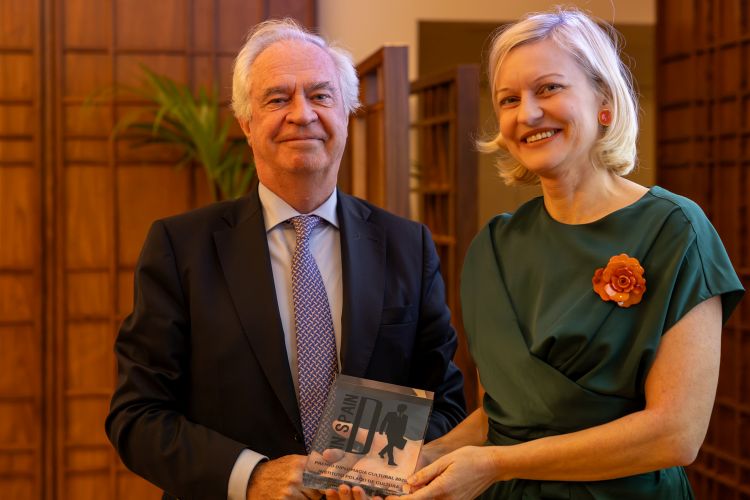
She also highlighted that, during the previous Polish Presidency of the Council of the EU (between January and June 2025), the Institute carried out “approximately 45 projects in 15 cities in Spain, the vast majority focused on women.” Through culture, she continued, they have addressed, among other topics, gender identity, depression, cultural relations with indigenous peoples, artificial intelligence, disinformation, and “the memory of war.” “On several occasions, we have also discussed the war in Ukraine,” she specified.
Next, it was the turn of the Argentine Ambassador to Spain, Wenceslao Bunge, who received the award from Asela Pintado. In his speech, the ambassador stated that his country is experiencing “a very special moment” of “a profound transformation.” “Our president (Javier Milei) has set a very clear course in terms of stabilizing the country’s macroeconomy, restoring stability, boosting the country’s competitiveness, and opening the country to the world,” he declared.
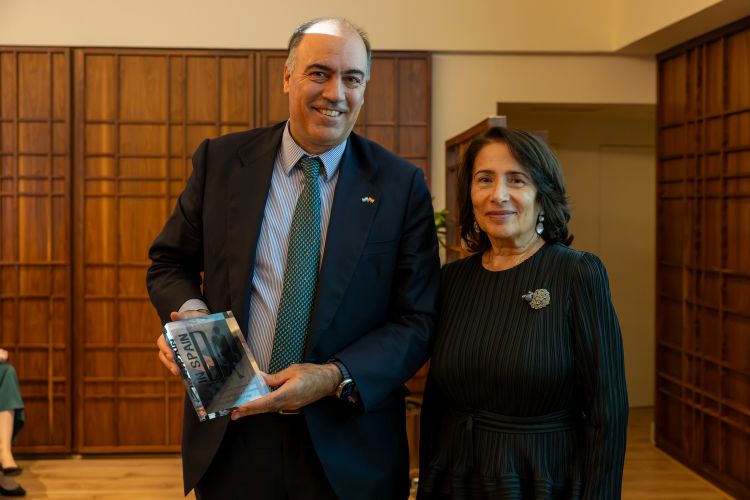
“As ambassador, and not a career diplomat, as many know, applying some principles from the private sector, we have established certain objectives, measurable objectives, all of which revolve around the economic sector. That is why this economic diplomacy is something that is close to our hearts,” he continued. Among the objectives that are most relevant to him as ambassador, Bunge cited increasing Argentine exports to Spain, attracting direct investment from Spain to Argentina, and improving tourism, “one of Argentina’s pillars.”
Finally, the editorial director of Prensamedia, Jesús González Mateos, presented the special award to Daniel Calleja Crespo, who until now had served as Director General of the Legal Service of the European Commission and who will soon take up his post as Director of the European Commission Representation in Spain.
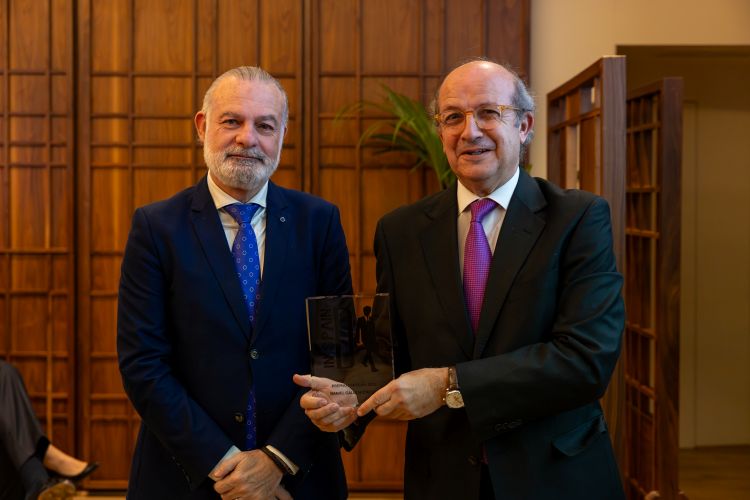
“This award is being given at a very important time, because we are just days away from celebrating the 40th anniversary of Spain’s accession to what was then the European Community,” Daniel Calleja noted. “Spain’s accession to the European Union was the fruit of a very difficult and complex negotiation that fulfilled the aspirations for freedom and prosperity of a people who, thanks to Europe, regained a leading role, a role we had lost for a long time, perhaps for too long,” he continued.
“Forty years later, looking back, Spain and the Spanish people have benefited extraordinarily from our membership in the Union,” the award recipient continued. “Thanks to the European Union, Spain has modernized its infrastructure, new technologies have been developed, innovation has been promoted, and new rights have been granted to our citizens. Furthermore, they have been able to exercise the fundamental freedoms enshrined in the Treaty: the freedom to study, to travel, to work, to settle in other Member States of the Union, to expand opportunities for our businesses, and to belong to a very select club based on certain values,” he emphasized. “But this has not been a one-way street; Europe has also benefited, and benefited immensely, from Spain’s membership,” he added.
Martínez Belío
The event was closed by the Secretary of State for Foreign Affairs and Global Affairs, Diego Martínez Belío, who stated that “international information is becoming increasingly important” because, “if we look at the arc surrounding Europe, in its entirety, from Ukraine, through the Middle East, Sudan, and the Sahel, we are surrounded by conflicts.”
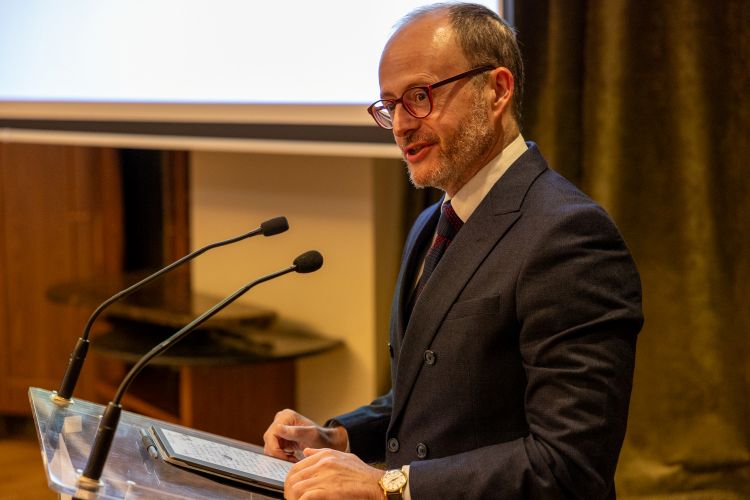
“That is why it is so important that our citizens are aware that we have a lot at stake, because good information, this awareness, is what also strengthens a government and a country to go out into the world with confidence and contribute to dialogue, stability, and that commitment to multilateralism which I would say is one of the defining characteristics of Spain’s foreign policy, in addition to its European commitment,” he stated.
In this context, the Secretary of State especially valued “the importance of diplomatic work,” whose main function is “to soften differences and present one’s country’s positions in a way that is easier for the other side to accept, and also to better understand and empathize with the other side to understand its circumstances.” “If I had to summarize and define the most important characteristic of a diplomat, it is the ability to understand the other person’s position, and that is what we try to do at the Ministry of Foreign Affairs, European Union and Cooperation,” he concluded.




